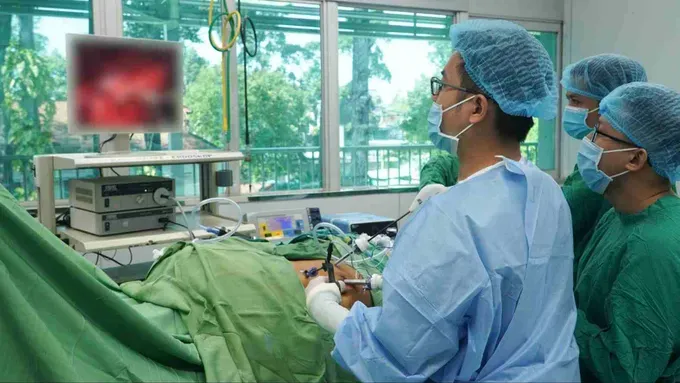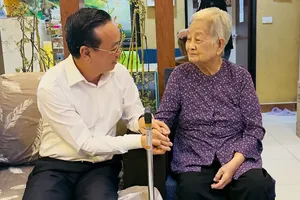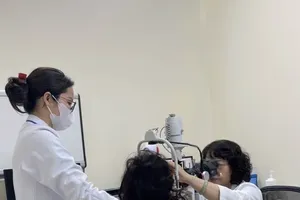
More drugs, more treatment options
At the end of October 2025, the Ministry of Health approved the circulation of Pembroria (pembrolizumab 100mg/4ml), produced in the Russian Federation. This biologic drug contains the same active ingredient as Keytruda, a well-known American immunotherapy that has been available in Vietnam since 2017. Pembroria is approved for a wide range of indications, including melanoma, non-small cell lung cancer, head and neck squamous cell carcinoma, classical Hodgkin lymphoma, urothelial carcinoma, esophageal carcinoma, cervical cancer, renal cell carcinoma, endometrial carcinoma, triple-negative breast cancer, gastric or gastroesophageal junction adenocarcinoma, and cholangiocarcinoma, among others.
In addition, Vietnam has, for the first time, participated in a phase 2A clinical study of an oral immunotherapy, RBS2418, for late-stage colorectal cancer (VISTA-1 project). The study, conducted by Tam Anh General Hospital in collaboration with Stanford University (USA), has shown promising early results after six months of treatment involving eight patients, no significant side effects have been reported and initial response signals appear positive.
Dr. Le Tuan Anh, Director of the Oncology Center at Cho Ray Hospital, noted that the Ministry of Health has not yet published data on Pembroria’s treatment efficacy based on clinical trial results submitted for licensing. He emphasized that treatment outcomes and regimens depend on each individual case, and not all patients with the mentioned cancers are eligible for Pembroria. The drug’s use is determined through a personalized approach tailoring treatment plans to each patient’s unique condition.
According to the Drug Administration of Vietnam under the Ministry of Health, approximately 100 oncology drugs and biologics are currently registered for circulation in the country. This growing diversity allows doctors to design more personalized treatment regimens while reducing dependence on imported or temporarily supplied medicines. Alongside newly approved drugs, the domestic clinical trial network has expanded significantly. For example, K Hospital recently launched a study combining targeted therapies for HER2-positive bile duct cancer, a rare and hard-to-treat condition, while major hospitals such as Cho Ray and Ho Chi Minh City Oncology Hospital are actively enrolling patients in phase 1–3 clinical trials.
Reducing patients’s financial burdens
The Ministry of Health reports that Vietnam currently has about 180 ongoing clinical studies, over 70 percent of which focus on cancer treatment. Hospitals such as Ho Chi Minh City Oncology Hospital, Cho Ray Hospital, K Hospital, and the National Children’s Hospital are conducting trials of next-generation drugs. According to data from K Hospital, the average annual treatment cost for a cancer patient is around VND176 million, of which health insurance covers roughly VND52 million, leaving patients to pay the remainder themselves. For targeted and immunotherapy treatments, costs can reach between 500 million and several billion Vietnamese dong per year, depending on the cancer type and treatment protocol.
Nguyen Huu Hung, 56, from Vinh Long Province’s Quoi An Commune, shared that participating in a clinical trial has given him access to advanced therapies before they are commercially available.
In May 2025, amid rising cancer incidence and mortality, Vietnam Vaccine Joint Stock Company (VNVC) signed a strategic cooperation agreement with the Russian Direct Investment Fund (RDIF) to promote research and technology transfer for producing advanced vaccines and biologics. Under the agreement, VNVC aims to introduce cancer-treatment vaccines based on Russia’s modern mRNA technology, while collaborating with the Gamaleya Center and Binnopharm Group to advance the research, production, and commercialization of vaccines and biologic drugs for cancer diagnosis and treatment. These initiatives are expected to reduce Vietnam’s dependence on foreign medical supplies and improve access for cancer patients.
According to Dr. Vo Duc Hieu, Deputy Director of Ho Chi Minh City Oncology Hospital, Vietnam’s cancer cases have nearly doubled over the past decade — from 92,000 in 2010 to more than 180,000 in 2022. Most cases are diagnosed late, reducing treatment effectiveness and increasing costs. The Global Cancer Observatory (Globocan) forecasts that by 2045, new cancer cases in Vietnam will rise by 45 percent, continuing to strain both the healthcare system and affected families.
The emergence of new-generation drugs and expanded clinical trial opportunities represents a true “door of hope” as they are not only improving treatment outcomes but also marking a major step forward in bringing advanced therapies to Vietnamese patients.
Ministry’s proposal to add 81 new drugs to health insurance coverage
The Ministry of Health recently met with relevant authorities to discuss a draft circular updating the list of pharmaceutical drugs, biologics, radioactive substances, and markers covered by national health insurance. The proposal includes 81 new drugs, mainly for treating cancer, cardiovascular disease, diabetes, hypertension, infections, and fungal diseases. It also expands the scope of 357 drugs to be available at commune-level health stations and primary care facilities, and suggests adjusting reimbursement rates for 47 existing drugs already included in the insurance list.
























